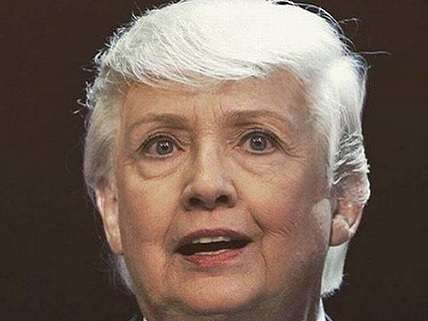Why Donald Trump and Hillary Clinton Are the Equivalent of "Sick Building Syndrome"
Neither major party's leading candidate represents something new. They are the last gasp of a broken system.

Former political consultant and current ABC News analyst Matthew Dowd writes that the two leading candidates in the GOP and Democratic primaries are awful—and setting up a major transformation in partisan politics.
Is what Donald Trump says and how he acts where the vast majority of our country wants to go? Of course not. He is a bully, and appeals to some of the worst instincts of America.
But he has highlighted and is accelerating the disruption our politics so badly needs. Should he be president of the United States? I certainly hope not, but if his emergence helps destroy the sick building so many of us try to enter, then he has served a valuable purpose.
Is turning to Hillary and the status quo where the country wants to go? I don't think so because the majority of American's distrust and dislike her and she would be one of the most polarizing people ever elected, if she were to win. But she has served a laudable purpose in helping give rise to incredible disruption on the Democratic side of the aisle.
Dowd likens the current situation with the major parties to "sick building syndrome." That is, each party is a toxic environment that can't be salvaged or rehabbed, only destroyed:
The structure and the building of our politics are sick. You can be a very healthy person and if you walk into a house that is mold-ridden with no circulation and has lead pipes, you are going to get sick. The question becomes how sick do you get.
Good and healthy people can't go in a sick building and hope to paint the walls and think the building is better. It needs to be torn down. Good, well-intentioned people will become ill entering into the status quo of our political system, and it is time we admit that….
It is just time we quit thinking we can fix the problem from within the current party structure. It may take some time, and will take much effort and creativity, but we, as a nation, are worth it.
Dowd is short on specifics in his op-ed. Part of that is because of the short length of the format but part of it is what he openly admits: He doesn't have set answers. But as the co-author (with Matt Welch) of a book called The Declaration of Independents, I heartily agree with Dowd that the Democratic and Republican Parties, in their current configurations, are salvageable. They have painted themselves into bizarre ideological corners where each is at or near historic lows in terms of voter identification and each looks likely to nominate a presidential candidate who is genuinely unappealing to most Americans (and that's whether it's Trump or Cruz for the GOP, or Clinton or Sanders for the Dems).
Call it epistemic closure or echo-chamber syndrome or whatever you want, but the major parties have rigged their games so perfectly that they speak only to smaller and smaller groups of hard-core zealots who are further and further removed from what any of us actually give a shit about. Hence, Republicans are constantly harping on illegal immigrants (who are actually leaving the country due to our lackluster economy) and the $500 million in federal funding for Planned Parenthood (money that can't be spent on abortion-related services) and the Democrats can't stop yapping about income inequality and, well, Planned Parenthood. Neither party seems capable or willing to talk about actually putting forth agendas that might allow the economy to restart itself in a big way, or how to fix entitlement spending, or have a serious conversation about foreign policy.
As Dowd points out, Trump and Clinton represent not the start of anything new or exciting in politics. They are instead the pothole-ridden cul de sac of the the past 15 years or more of instensely partisan and genuinely awful governing.
The challenge for libertarians—who bear no responsibility for the debacles of either the Bush or Obama years—is how to take advantage of our surging popularity (see Gallup on this!) among voters and parlay into party platforms that promise less but deliver results effectively, and in a way that increases not just economic growth but cultural and social freedom. Which is of course is what this website is all about.


Show Comments (324)